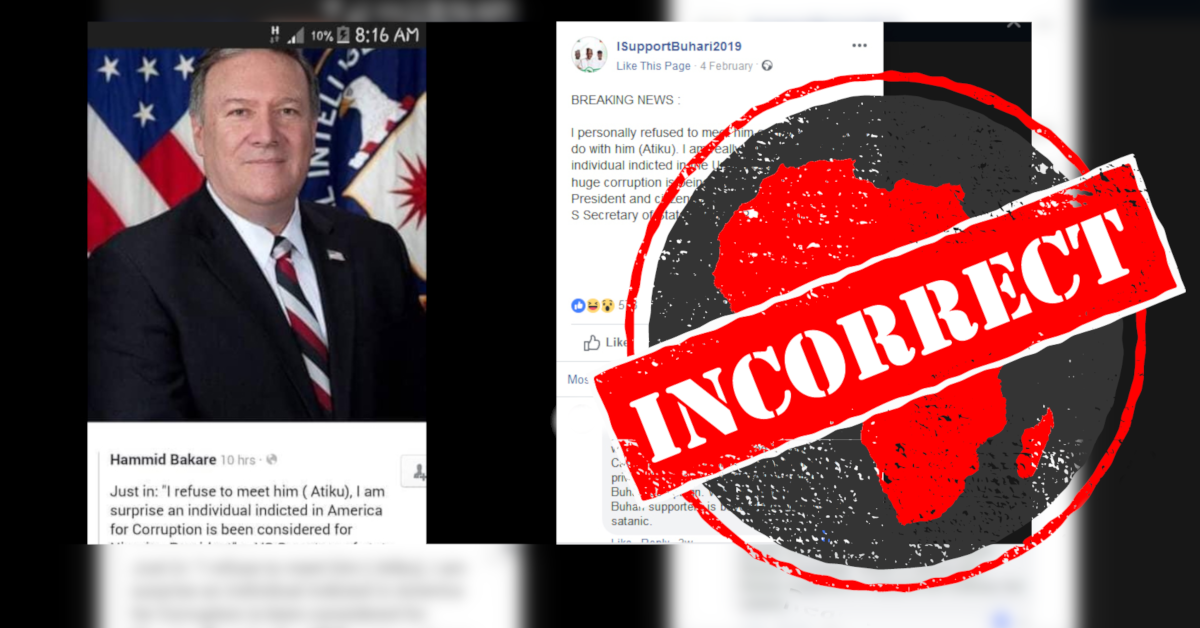The United States government has debunked a post circulating on Facebook and Whatsapp that claims secretary of state Mike Pompeo refused to meet Atiku Abubakar, the presidential candidate for the Peoples Democratic Party, when the Nigerian politician visited the US.
Nigeria held national elections on 23 February 2019 with Abubakar’s main rival Muhammadu Buhari declared the winner.
It was widely believed that corruption allegations prevented Abubakar from entering the US.
When he did travel there, his critics advanced theories about the trip. One said that Pompeo refused to meet Abubakar in the US, describing him as corrupt.

The 4 February 2019 Facebook post by the page ISupportBuhari2019 has been shared over 4,500 times.
The post quotes Pompeo as saying: “I personally refused to meet him or have anything to do with him (Atiku). I am really surprised that an individual indicted in the United States of America of huge corruption is being considered for Nigeria President and citizens are even supporting him.”
The US Embassy in Nigeria debunked the post in a tweet on 21 February, describing it as “fake news”.
On 15 February Abubakar announced on Twitter that he spoke with Pompeo on the phone regarding the US commitment to free and fair elections in Nigeria. - Allwell Okpi (27/02/2019)
Nigeria held national elections on 23 February 2019 with Abubakar’s main rival Muhammadu Buhari declared the winner.
It was widely believed that corruption allegations prevented Abubakar from entering the US.
When he did travel there, his critics advanced theories about the trip. One said that Pompeo refused to meet Abubakar in the US, describing him as corrupt.

US embassy tweets ‘fake news’
The 4 February 2019 Facebook post by the page ISupportBuhari2019 has been shared over 4,500 times.
The post quotes Pompeo as saying: “I personally refused to meet him or have anything to do with him (Atiku). I am really surprised that an individual indicted in the United States of America of huge corruption is being considered for Nigeria President and citizens are even supporting him.”
The US Embassy in Nigeria debunked the post in a tweet on 21 February, describing it as “fake news”.
On 15 February Abubakar announced on Twitter that he spoke with Pompeo on the phone regarding the US commitment to free and fair elections in Nigeria. - Allwell Okpi (27/02/2019)
Republish our content for free
For publishers: what to do if your post is rated false
A fact-checker has rated your Facebook or Instagram post as “false”, “altered”, “partly false” or “missing context”. This could have serious consequences. What do you do?
Click on our guide for the steps you should follow.
Publishers guideAfrica Check teams up with Facebook
Africa Check is a partner in Meta's third-party fact-checking programme to help stop the spread of false information on social media.
The content we rate as “false” will be downgraded on Facebook and Instagram. This means fewer people will see it.
You can also help identify false information on Facebook. This guide explains how.





Add new comment